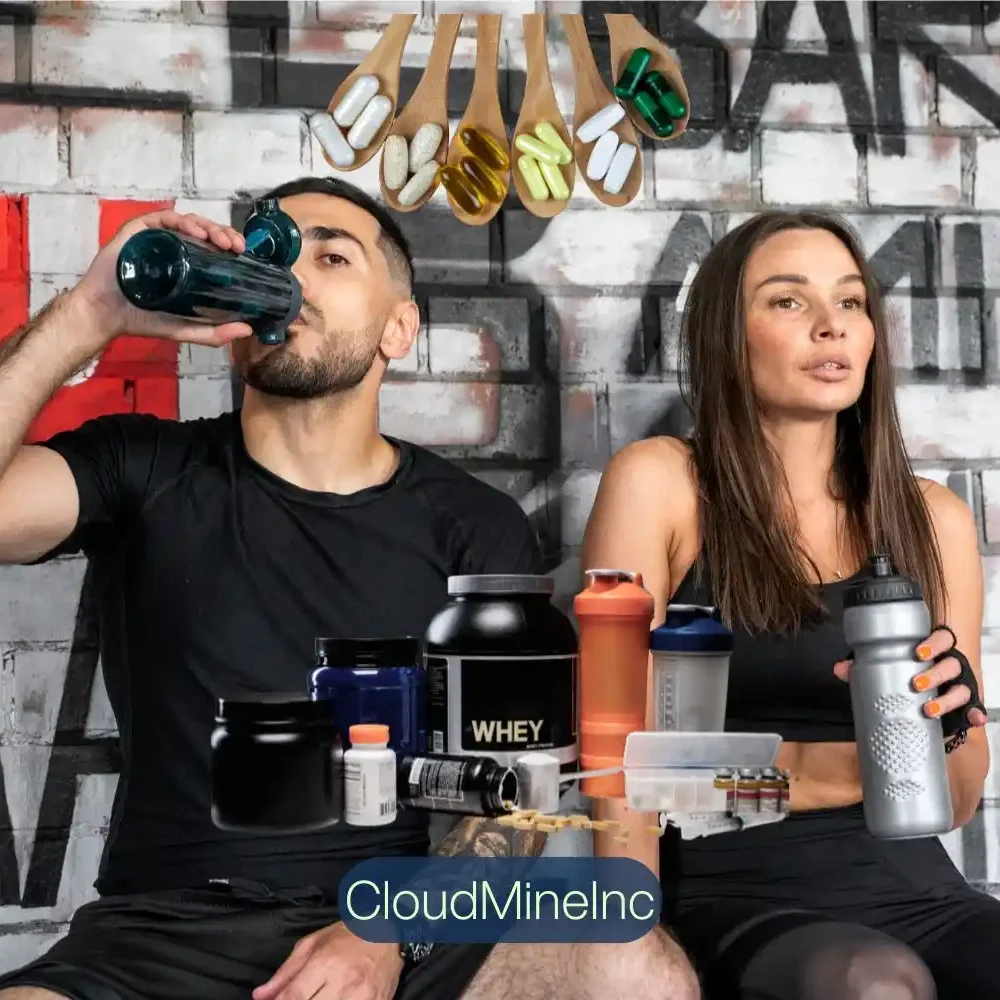
Last Updated on August 28, 2025 by Beth Skwarecki
The gym supplement industry has grown to $13.98 billion, and experts predict it will double by 2027. Scientific research supports the benefits of specific workout supplements, especially when you have certain training goals.
The International Society of Sports Nutrition classifies several muscle-building supplements as safe and effective with proper usage. Research proves that creatine can improve exercise capacity. Additionally, protein supplements increase muscle size and strength in adults who do resistance training.
This article will explain the science behind gym supplements and their effects on your body. You’ll discover if these supplements align with your fitness experience. The content covers proper timing, dosages, and effective supplement combinations that deliver optimal results.
What Gym Supplements Actually Do in Your Body
Gym supplements target specific processes in your body that help you train harder, recover faster, and build more muscle. Let’s explore what happens in your body when you take these supplements.
How Do Supplements Support Energy and Endurance?
Supplements boost energy and endurance by improving how your body produces and uses energy during exercise. Creatine stands out as one of the most studied supplements. Research shows it raises intramuscular phosphocreatine levels by about 30% when you keep taking it. This directly affects your energy production during intense workouts.
Most pre-workout supplements contain caffeine, which works in several ways. It blocks adenosine receptors in your central nervous system and reduces fatigue. Your performance improves in both endurance and power exercises when you take between 3-6 mg/kg of body weight. On top of that, it boosts endorphin release and makes your nerve-muscle connection better, so workouts feel easier.
Beta-alanine helps your endurance by raising muscle carnosine levels. This acts as a buffer against acid buildup during intense exercise. Taking 4-6g daily for at least 2 weeks can improve your performance by a lot in activities that last 1-4 minutes. This explains why you can push through those tough final sets at the gym.
Beetroot supplements offer nitric oxide benefits that help endurance athletes. Nitric oxide opens up your blood vessels, which improves blood flow and oxygen delivery to working muscles. Your cardiovascular system becomes more efficient, using less oxygen during moderate exercise.
What is the Role of Supplements in Muscle Repair and Growth?
Muscles don’t grow during training—they develop during recovery, and specific supplements speed up this process. Protein supplements are vital to recovery because they provide the raw materials for muscle repair. Research shows that protein supplements can boost muscle mass and performance when you train properly and eat according to recommendations for active people.
Athletes doing intense exercise should aim for 1.4–2.0 g/kg of body weight in daily protein intake to support muscle protein synthesis. This amount is nowhere near the general recommendation of 0.8 g/kg.
Some amino acids have special roles in recovery. Glutamine supplements reduce muscle damage markers in your blood and keep a good balance between muscle-building and muscle-breaking hormones. HMB (beta-hydroxy-beta-methylbutyrate) helps you recover faster from muscle damage and might improve strength, power, and muscle growth in both trained and untrained people.
The timing of your supplements matters too. Studies show that taking protein after workouts helps increase protein synthesis and muscle growth more effectively. But research isn’t settled—some studies suggest taking protein before workouts might work better by stocking up on amino acids before exercise starts.
The Science Behind the Most Popular Workout Supplements
Scientific research shows why some gym supplements deliver real benefits while others don’t measure up. Let’s learn about the most effective workout supplements you can find today.
#1. Creatine: Energy and Strength
Creatine ranks among the best-studied supplements with proven performance benefits. Your muscles store this natural compound as phosphocreatine and use it to produce energy faster during intense workouts. Studies show creatine supplements increase intramuscular creatine concentrations, which explains the improvements in high-intensity exercise performance.
To saturate muscle stores, you need 5g of creatine monohydrate four times daily for 5-7 days. After that, 3-5g daily maintains these levels. Creatine benefits athletes who need quick bursts of speed or more muscle strength, like sprinters and weightlifters.
#2. Protein powders: Recovery and Muscle Building
Protein supplements help build and maintain muscle by providing amino acids that boost muscle synthesis. Research shows that protein combined with resistance training builds muscle and improves physical performance and recovery.
Athletes doing intense exercise should aim for 1.4-2.0g of protein per kg of body weight daily. Protein powders are convenient, but you can get enough protein from food sources.
#3. Caffeine: Focus and Performance
Caffeine stimulates your central nervous system by blocking adenosine, which makes exercise feel easier. Research proves caffeine boosts performance at doses of 3-6mg/kg body weight.
This stimulant releases more endorphins, improves nerve-muscle function, and sharpens alertness. Caffeine works for both endurance and power activities, but it’s most effective in endurance sports.
#4. Beta-alanine: Reducing Fatigue
Beta-alanine raises muscle carnosine levels to buffer acid buildup during intense exercise. This process delays fatigue, especially in exercises lasting 1-4 minutes.
Taking 4-6g daily for 2-4 weeks improves exercise performance, especially in high-intensity interval training or short sprints. You might feel a harmless tingling sensation (paraesthesia) as a side effect.
#5. BCAAs: Muscle Preservation
Branched-chain amino acids (leucine, isoleucine, and valine) are vital for muscle protein synthesis, with leucine leading this process. Research on resistance athletes shows BCAAs can reduce muscle soreness after exercise.
BCAAs might decrease protein breakdown during exercise and lower creatine kinase levels, which indicate muscle damage. These amino acids are accessible to more people for muscle preservation, but their performance benefits aren’t as proven as creatine or protein.
When and how to use gym supplements effectively?
The right timing of supplements can make a big difference to how well they work. The smart use of gym supplements isn’t just about what you take – it’s also about the time and way you take them.
Pre-workout vs Post-workout Timing
You should take pre-workout supplements with caffeine 15-30 minutes before exercise. This works best because caffeine hits its peak 30-60 minutes after you take it. This timing means you’ll have maximum energy during your workout instead of hitting a wall mid-session.
- Creatine gives you more options. Many people take it before working out, but studies show that taking it daily matters more than the exact timing.
- Beta-alanine works the same way – your muscle carnosine levels go up gradually whatever time you take it, as long as you take it regularly.
- Your body needs protein within 30-60 minutes after working out to build muscle effectively. People who do intense exercise should aim for 20-30g of protein after training to recover properly.
How Much is Too Much?
Stick to what science recommends: 3-5g of creatine daily after the loading phase, 1.4-2.0g protein per kg bodyweight daily for athletes, and no more than 400mg caffeine daily.
Taking too much can cause problems:
- Stomach issues (common with too much sodium bicarbonate, arginine)
- Tingling feelings from beta-alanine doses over 800mg
- Sleep problems when you take caffeine too late (it stays in your system for 5 hours)
- Jitters, headaches, or a racing heart from too much pre-workout
Combining Supplements with Food for Best Results
Taking supplements with the right meals will boost their effectiveness. Your body absorbs creatine better when you take it with food that has both carbs and protein (about 50g each). This mix triggers insulin release, which helps get more creatine into your muscles.
Light, easy-to-digest food with your pre-workout supplements can prevent stomach discomfort but still let them work well. Fat-soluble supplements work better when you take them with meals that include healthy fats.
Your overall nutrition plan is still the key. Research shows that supplements work best when you add them to good eating habits—they’re not replacements. This is a big deal as it means that even the best supplements only add small improvements compared to eating quality food regularly.
Who Really Needs Gym Supplements?
Most people don’t need gym supplements, even though they’re widely used. The sports nutrition market continues to grow, expected to reach £81.45 billion in 2025 and £144.18 billion by 2033. This raises an important question: who needs these products?
Elite Athletes Vs. Everyday Gym-goers
Elite athletes who train multiple times daily can gain the small advantages that make the difference between winning and losing. These athletes just need precise nutrition timing and often can’t eat enough whole foods to fuel their intense training and recovery needs.
Regular gym-goers don’t need supplements when they follow a balanced diet. Research shows that protein supplements aren’t necessary if you get enough protein from food. Studies also confirm that water works perfectly fine to rehydrate during moderate exercise sessions under an hour.
Most Americans already consume two to three times more protein than they need. This makes protein supplements unnecessary for casual exercisers. Despite that, many gym users take supplements regularly. They often rely on unreliable sources like the internet and media instead of consulting healthcare professionals.
People with Dietary Restrictions or Medical Needs
There are specific groups that truly benefit from supplements. People with medically diagnosed conditions that require higher protein or energy intake, such as cystic fibrosis, often depend on supplements to meet their nutritional needs.
Dietary restrictions create another valid reason to use supplements. Vegans and vegetarians might struggle to get enough protein without them. These groups can benefit from plant-based options like soy, pea, and hemp protein as alternatives to animal-derived products.
Older adults form another group that might need supplements since protein requirements increase with age. Research indicates that older people don’t get the same benefits from protein supplementation as younger people unless they take higher amounts.
A nutritious diet should always come first, and supplements should only complement it. The Australian Institute of Sport emphasises that you need a full picture of your nutrition before deciding to use supplements.
Conclusion
Research clearly shows that gym supplements can improve performance and recovery with proper use. The supplement industry keeps growing, yet results depend on your fitness goals, training intensity, and dietary requirements.
Athletes at the elite level and people with dietary restrictions can benefit substantially from supplementation. But casual gym-goers who maintain a balanced diet might find most supplements to be unnecessary extras rather than vital additions to their routine.
Note that supplements deliver the best results with proper nutrition, not as substitutes for whole foods. Your diet, training goals, and current nutritional intake need assessment before starting supplements. On top of that, it helps to ask a sports dietitian who can determine if supplements would truly benefit your fitness experience.
What’s the bottom line? Supplements can work, but don’t expect miracles. Fitness success comes from consistent training, proper nutrition, and enough rest. Supplements might provide that extra edge, but they can’t replace the fundamentals of a well-laid-out fitness programme.

Cynthia writes about fitness, nutrition, and weight management with a focus on sustainable results. Blending workout tips, healthy eating strategies, and motivational insights, Cynthia helps readers stay on track with their fitness journey and build a healthier, stronger lifestyle.